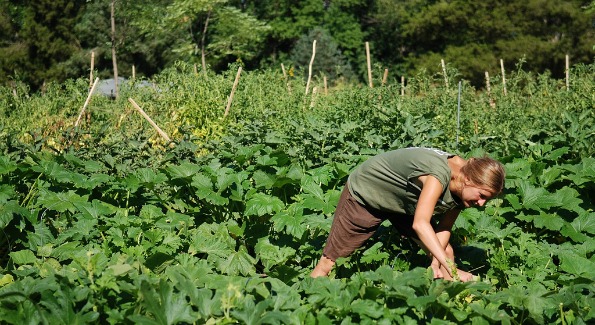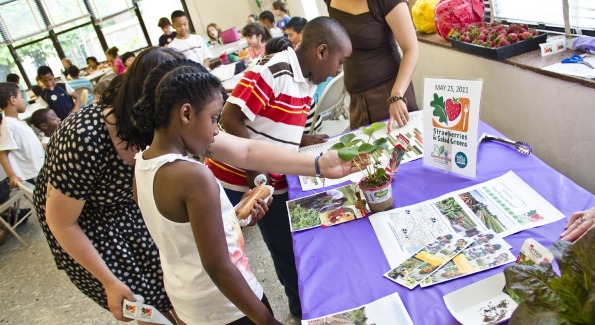Non-profit seeks to bring environmentally conscious, healthy food to the nation’s capital.
By Kinne Chapin
Next to breathing and sleeping, food is one of the necessities of human life. We eat breakfast, lunch, and dinner, we go out to brunch, we grocery shop, we sneak snacks when we think no one is watching. But because food is ever-present in our lives, we often forget that what we eat has an impact on both our body and our surrounding community. Enter Arcadia, a local nonprofit dedicated to supporting local farmers, improving the environment, and keeping the district healthy with a sustainable food network.
Arcadia has turned a portion of the Woodlawn Plantation, a National Historic Trust Site, into a sustainable farm. Located in Alexandria, this site makes Arcadia the closest working farm to Washington, D.C. Arcadia uses their land to grow heritage and heirloom produce and raise livestock according to the highest standards, in order to enrich the metro area’s biodiversity and provide an environmental and economic model for others who wish to start sustainable farms. But Arcadia doesn’t only want to educate other farmers about the importance of high quality produce, they also hope to spread the knowledge among the city’s children. The Arcadia Farm to School Network aims to introduce healthy, locally grown food into school meals. Budding foodies can also visit the farm with their schools, or even participate in Arcadia’s summer camp, where they can grow, cook, and– best of all– eat local foods.
It’s not only kids who get to enjoy the fruits of Arcadia’s mission. With Arcadia’s Mobile Markets, the nonprofit brings its produce, eggs, meat, and milk to neighborhoods across the district in a refitted school bus. By bringing nutritious and affordable food to areas with limited access to healthy produce, Arcadia hopes to encourage better lifestyle choices and thus support the health of citizens across the city. In order to support their produce with information, Arcadia accompanies their market with cooking demonstrations and explanations about additional local resources for healthy food. This year’s mobile markets begin in May– check Arcadia’s website to see if their bus will come to you.
With its goals of sustainable and attainable produce for all of the capital’s denizens, Arcadia reminds us that dinner is about more than microwaving a Lean Cuisine. Choosing food has an impact on our bodies, our communities, and our environments– and we have a responsibility to ensure that everyone has access to a full set of choices.
Q&A With Matt Mulder, Director of Development and Communications
Washington Life: What is Arcadia’s mission?
Matt Mulder: Arcadia’s mission is to improve the health of our community, the viability of local farmers, and preserve our environment for future generations by combining education about healthy food and its sources with better logistical connections between local farmers and the urban and suburban core of the region.
We sometimes simplify this by saying that we’re working to create a more sustainable food system in the Washington, DC region.
WL: How was Arcadia founded?
MM: Arcadia Center for Sustainable Food and Agriculture was launched in 2010 by Michael Babin, president of the Neighborhood Restaurant Group (NRG), an organization of 12 Washington, DC-area culinary establishments dedicated to using locally sourced ingredients whenever possible, and cultivating a network of environmentally conscious, quality-driven purveyors.
Mr. Babin, Chairman of Arcadia’s Board of Directors, saw the need for a non-profit initiative that would bring NRG’s commitment to the important issues of food access, food security, and environmental sustainability to fruition. He envisioned an organization that would educate farmers and consumers about sustainable agriculture, aggregate local products for viable markets, and assure that communities in need have access to healthy, local food. This vision became Arcadia.
In 2010, through a partnership with the National Trust for Historic Preservation (Arcadia’s Fiscal Sponsor), Arcadia established agricultural operations on the grounds of historic Woodlawn Plantation, once a part of George Washington’s farms at Mount Vernon. In 2011, Arcadia became the organizational home for the D.C. Farm to School Network and began development of the Mobile Market. The creation of a Food Hub is the next program in development. The coordination of these programs allowed Arcadia to begin an effort to transform the entire food system in the Washington, DC region, from producer through to consumers.
WL: How can locals get involved?
MM: There are plenty of ways to get involved, here are just a few:
• By volunteering with our programs (volunteering at the farm, with school trips, public events, market activities, etc.)
• By supporting us through financial or in-kind donations.
• By coming to our Mobile Market or Farm Stand stops and buying produce.
• By coming to our public events, registering for our pilot summer camp program, or working with their schools or groups to arrange a farm visit or program.
• By partnering with our programs – We are looking for agricultural partners for supplying goods for the market and future hub; By connecting us with schools; by working with us to increase food acess in their neighborhoods through the mobile market; etc.
• By contacting their local, state, and federal representatives to support funding and support for work like ours.
• By reading our blog, visiting our facebook page, following us on twitter, or signing up for our newsletter.
WL: What sets you apart from other DC nonprofits?
MM: I believe there are a number of things that set us apart from other DC nonprofits. First is our approach to the Whole Food System. We are approaching the Food System in the DC area in a holistic, systematic way. There are a number of groups working on one or two components (producers and suppliers, educating consumers, access, distribution) but our programs are working to address the whole system from producer through to the consumer. We are working on demonstration of sustainable production methods, training farmers, and are actually producing food. We are working to connect farmers with markets/outlets in the area. We are working to develop and create new markets in the area. We are working to Improve and address food distribution and access issues. We are working to bring food into neighborhoods that have little to no access. We are working to educate children and adults about nutrition; healthy eating; and how to find and prepare local, healthy food. We are working to build the capacity in neighborhoods to take over access and distribution of local food once we have established the market. And we are advocating for policies that will allow for better access to healthy, local, sustainably grown foods, and the development of a more sustainable food system.
Secondly, our connection with the Neighborhood Restaurant Group is somewhat unique. The relationship with the restaurants in the group allows us to have an available market for our own produce, provides an opportunity to work closely with incredibly talented chefs for programs and events, and gives us an after-market outlet for produce that does not sell from our Mobile Market. It also puts us in a unique situation to work with the restaurants to educate their customers about the benefits of local, sustainable grown and raised food. The NRG staff has dedicated a great deal of their own time, energy, and money to supporting our programs at the farm, in the schools, and in the community. In addition to that, we have an excellent working relationship with the NRG staff who have assisted greatly with marketing, public relations, graphic design, and event planning. The Neighborhood Restaurant Group is an incredible partner with whom we’re lucky to work.
WL: Finish this sentence: I want people in DC to know that…
MM: A more sustainable food system in the Washington, DC is definitely possible, would benefit everyone from the producer to the consumer, and is crucial to the long term physical, environmental, and economic health of the region.
Additionally, local, sustainably grown and raised food should be available to everyone, and we are working to make that happen.








